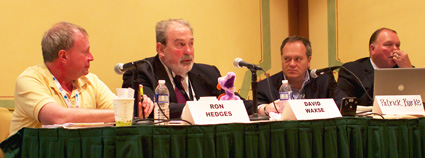Although primarily a forensics conference, CEIC, the Computer Enterprise and Investigations Conference, has an e-discovery track whose purpose is to raise awareness of the context in which data forensics are used beyond the law enforcement where they began. The cross-border panel in which I took part was one aspect of this. Another regular feature is a judicial panel which was moderated, as usual, by Patrick Burke of Guidance Software.
The panel comprised former US Magistrate Judge Ronald Hedges, now a Special Master, US Magistrate Judge David Waxse and Hon. Donald E. Shelton, Chief Judge – Washtenaw County Trial Court, Ann Arbor, Michigan. Ron Hedges also introduced his pink friend, seen in the photograph below, but we never got to find out what his contribution was to the debate – the others had more than enough to say in the 90 minutes allocated.
These inevitably focus on practice under the Federal Rules of Civil Procedure. Some terminology apart, however, what was said applies equally in any jurisdiction
The key points were:
The New York Times article Armies of Expensive Lawyers, Replaced by Cheaper Software whose message, in summary, was that “lawyers are on their way out and IT was taking over” was challenged by articles by Ralph Losey and by me which had challenged the conclusion in the NYT article and suggested that there were new opportunities for those willing to acquire new skills [Waxse]
There are too many lawyers who are still saying “I am just not comfortable using that stuff, Judge”. [Waxse]
Judge Facciola had spoken eloquently of the flower of legal youth reviewing documents whilst lawyers said they were nervous of using predictive coding to minimise this manual task. What sort of proof will satisfy a Judge? Judges were quite open to the use of such technology and the problem lay with the lawyers – judges respond to what the lawyers offer. There were still lawyers willing to say that they would be happy to print paper and scan it all back in if necessary [Waxse].
The meet and confer should include someone from IT and, indeed, anyone else who has something useful to add to a team approach [Hedges].
Mistakes will not always give rise to sanctions if a reasonable explanation is forthcoming [Hedges].
Rule 502 of the Federal Rules of Evidence, aimed at the cutting down the costs of privilege review, was not being used enough. Was it malpractice to litigate without a Rule 502 order? [Hedges].
Social media decisions had gone both ways [Quon and Stengart] as to whether there was or was not a reasonable expectation of privacy. What makes the difference will be policies and process in each case [Hedges]
We should aim for uniformity on sanctions – see the chart annexed to Victor Stanley 2 of the various regimes in different states [Hedges]
Many sanctions cases involved both failures and a misrepresentation as to what went on [Waxse]
What does “reasonably accessible” mean, specifically in the context of data in the cloud? The court’s line is likely to be “you put it there, you should get it back”, and legal departments should think about the discovery implications in parallel with IT’s consideration of the costs and operational factors. It will not be appropriate to argue that you cannot get the data back or that extra costs to get the extra reports required for electronic discovery made the data inaccessible [Hedges].
The key to the “just, speedy and inexpensive” criteria is co-operation, e.g. at a simple level an agreement to omit duplicates, up to more sophisticated discussions about what you are going to do and how [Waxse].
Privilege is a major cost driver. The integration between the Federal Rules of Civil Procedure and the Federal Rules of Evidence was complex – “Paul Grimm understands it” [Waxse]
The merit of requiring parties either to send a discovery agreement or a videotape of their discussions. The court has a camera – put them in there and require them to read Judge Grimm’s Mancia decision before they start their discussions [Waxse]
The Federal Courts are the superhighways, but most of us live on city streets [Shelton].
Know the judge almost ahead of knowing the law – there is a wide variation of experience and comprehension of discovery, and a tremendous amount of education is needed. Until we have that, there will be no consistency in the opinions and it will be very difficult to identify trends [Shelton].
The test is not “burdensome” but “unduly burdensome” [Shelton].
A party cannot just say “it is disproportionate” – it is necessary to price different ways of tackling a task [Hedges].
This last point rings bells for those of us familiar with the costs management pilot going on in Birmingham, where the court requires parties to state at the CMC what they intend to spend on the different stages ahead. That, like so much else said by this panel, makes sense whatever your jurisdiction.


